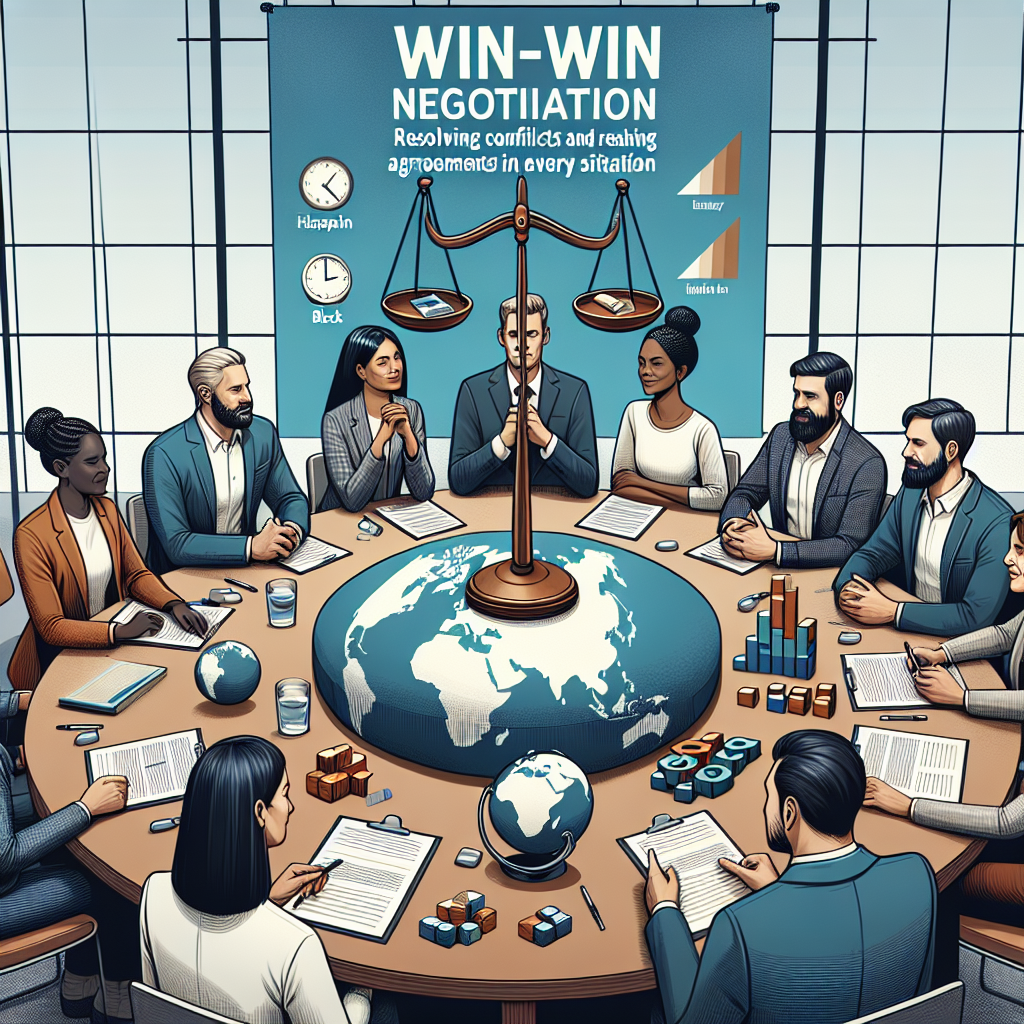Negotiation is a crucial skill in both personal and professional interactions. Whether you are negotiating a business deal, resolving a conflict with a colleague, or making a decision as a team, having effective negotiation strategies can make a significant difference in reaching a mutually beneficial outcome. In this article, we will explore win-win negotiation strategies that can help you resolve conflicts and reach agreements in every situation.
Win-win negotiation, also known as integrative or collaborative negotiation, is a negotiation strategy in which both parties work together to find a solution that satisfies their interests and leads to a positive outcome. Unlike win-lose negotiation, where one party wins at the expense of the other, win-win negotiation focuses on creating value for both parties and building a mutually beneficial relationship.
There are several key principles of win-win negotiation that can help you navigate conflicts and agreements effectively:
1. Focus on interests, not positions: In win-win negotiation, it is important to understand the underlying interests and motivations of both parties. By focusing on interests rather than positions, you can identify common ground and create solutions that meet the needs of both parties.
2. Collaborate and communicate: Effective communication is essential in win-win negotiation. By collaborating with the other party and openly sharing information, you can build trust and foster a positive working relationship.
3. Be creative and flexible: Win-win negotiation requires creativity and flexibility in seeking solutions. By exploring different options and considering alternative perspectives, you can generate innovative solutions that meet the needs of both parties.
4. Separate people from the problem: In win-win negotiation, it is important to separate the people involved from the problem at hand. By focusing on the issues rather than personal conflicts, you can work together to find solutions that benefit everyone.
5. Seek win-win outcomes: The ultimate goal of win-win negotiation is to reach outcomes that benefit both parties. By seeking win-win solutions, you can build strong relationships and create value for all involved.
In order to effectively implement win-win negotiation strategies, it is important to consider the following tips:
– Prepare and plan: Before entering into a negotiation, take the time to prepare and plan your strategy. Define your goals, interests, and priorities, and consider potential solutions and alternatives.
– Listen actively: Effective communication is essential in win-win negotiation. Listen actively to the other party’s concerns, interests, and needs, and ask clarifying questions to ensure full understanding.
– Be patient and persistent: Negotiation can be a complex and challenging process. Be patient and persistent in seeking solutions, and be willing to explore different options and alternatives.
– Stay focused on the big picture: In win-win negotiation, it can be easy to get caught up in minor details or conflicts. Stay focused on the big picture and the ultimate goal of reaching a mutually beneficial outcome.
– Build trust and rapport: Trust is essential in win-win negotiation. Build rapport with the other party, foster a positive working relationship, and demonstrate your commitment to finding a solution that benefits both parties.
– Use objective criteria: In evaluating potential solutions, consider objective criteria that can help guide your decisions. By using objective criteria, you can ensure fairness and transparency in the negotiation process.
– Be open to feedback: Feedback is a valuable tool in win-win negotiation. Be open to receiving feedback from the other party and be willing to adjust your approach as needed to reach a positive outcome.
– Stay positive and professional: Maintaining a positive and professional demeanor is important in win-win negotiation. Be respectful, courteous, and cooperative in your interactions, and focus on finding solutions that benefit both parties.
Win-win negotiation strategies can be applied in a wide range of situations, including business negotiations, conflict resolution, team decision-making, and personal relationships. By adopting these strategies and principles, you can improve your negotiating skills, build stronger relationships, and achieve positive outcomes in every situation.
FAQs:
Q: How can I identify common interests in a negotiation?
A: To identify common interests in a negotiation, it is important to actively listen to the other party, ask questions to clarify their needs and priorities, and look for areas of overlap or agreement. By focusing on shared interests rather than conflicting positions, you can create solutions that benefit both parties.
Q: What if the other party is not willing to collaborate in a win-win negotiation?
A: If the other party is not willing to collaborate in a win-win negotiation, it can be helpful to work on building trust and rapport, demonstrating your commitment to finding a mutually beneficial solution, and exploring different options and alternatives. If collaboration is not possible, it may be necessary to consider other negotiation strategies or seek assistance from a mediator or third party.
Q: How can I stay focused on the big picture in a negotiation?
A: To stay focused on the big picture in a negotiation, it can be helpful to define your goals and priorities in advance, consider the long-term implications of potential solutions, and keep the ultimate objective of reaching a mutually beneficial outcome in mind. By staying focused on the big picture, you can avoid getting caught up in minor details or conflicts and work towards a positive resolution.
Q: How can I build trust and rapport with the other party in a negotiation?
A: Building trust and rapport with the other party in a negotiation is essential for creating a positive working relationship. To build trust, demonstrate your integrity, honesty, and commitment to finding a mutually beneficial solution. Foster open communication, listen actively to the other party’s concerns, and show empathy and understanding. By building trust and rapport, you can create a foundation for collaboration and cooperation in the negotiation process.





Leave A Comment